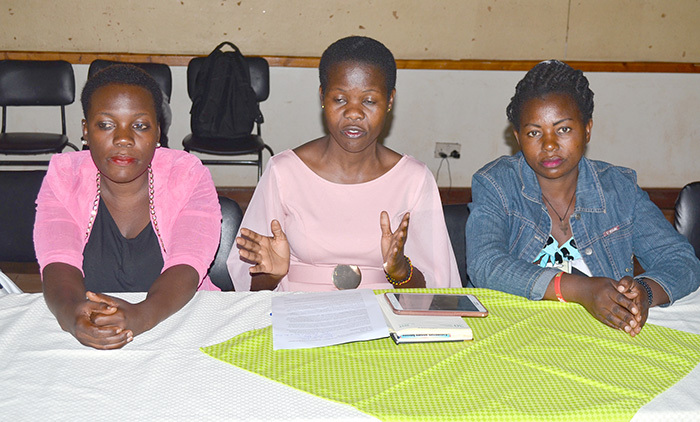Spina Bifida, hydrocephalus patients run out of drugs
'The drugs are currently not anywhere in the country and the children have been relying on donations from International federation for spine Bifida and child help International'
PIC: Parents and children born with Spina Bifida pose for a photo after a press conference at Namirembe Resource Centre. (Credit: Violet Nabatanzi)
NO DRUGS
Parents of children born with spina Bifida are worried over the current stock out of oxybutynin drugs meant to treat this condition.
The lifesaving medicine is used to treat symptoms of overactive bladder, such as frequent or urgent urination, incontinence (urine leakage). The drug is administered in the children's bladder using catheters twice a day to reduce muscle spasms of the bladder and urinary tract.
Speaking during a press conference at Namirembe Resource Centre, Ruth Nalugya, the executive director Spina Bifida and Hydrocephalus awareness network Uganda, said over 3,000 children in Uganda living with spina Bifida cannot control their bladders and bowel because the messages between the brain and the bladder and bowel are broken, which results in loss of sensation.
Spina Bifida is a Neural Tube Defect (NTD), a congenital disability, where by the spinal cord and vertebrae do not form completely and the neural tube fails to develop normally and this usually happens between the first 6 weeks after conception.
Nalugya said: "The drugs are currently not anywhere in the country and the children have been relying on donations from International federation for spine Bifida and child help International,''
She added that last month the International Federation for Spine Bifida released 1,600 capsules of oxybutynin, but the medicine was impounded by National Drug Authority because the shelve life was less than one year.
"Since last year, there has not been any supply from the donors either, which has led to high rates of kidney and bladder infections, isolation and some of the children whose parents cannot afford pampers have dropped out of school,'' she revealed

PIC: The executive director of Spina Bifida and Hydrocephalus awareness network Uganda, Ruth Nalugya, addressing a press conference at Namirembe Resource Centre as parents of children born with Spina Bifida look on. (Credit: Violet Nabatanzi)
On average, each child needs two capsules per month, but its cost is exorbitantly high. If an individual is purchasing it from abroad, the cost goes up to $5 each capsule.
The lifesaving drug, however, is not on the essential medicine list. It is against this background that the Spina Bifida and Hydrocephalus awareness network Uganda has appealed to the Government to provide this drug which is very essential in the treatment and rehabilitation of persons with Spina Bifida.
Cossy Lwanga, a mother of one of the children suffering from Spina Bifida, said they are spending too much money on buying pampers since her son cannot control urine without oxybutynin drug.
Efforts to reach NDA executive secretary Donna Kusemererwa were futile.